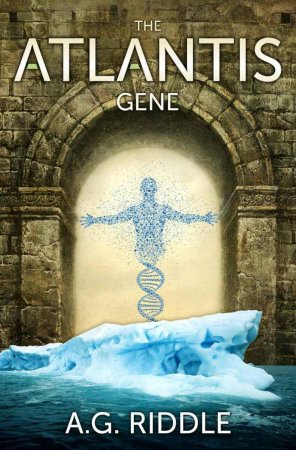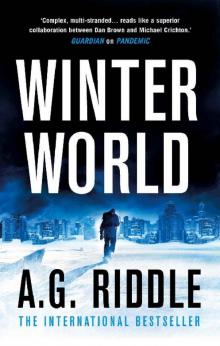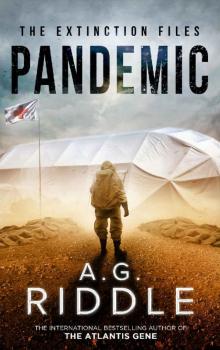- Home
- A. G. Riddle
The Extinction Files Box Set Page 13
The Extinction Files Box Set Read online
Page 13
Chapter 23
Lucas Turner felt like he had been in the hospital room in Mandera for years. He knew it had only been a few days, but those days had been the longest of his twenty-three years on Earth.
The disease had started with a pain in his neck, and a fever. He had felt fine otherwise. But a few hours later, his body was turning itself inside out. He vomited nearly everything he ate. The diarrhea emptied his bowels the moment any morsel reached them, then reached for more, like a hose sucking his insides out.
He was weak and constantly tired. It was impossible to concentrate. He drifted in and out of sleep, never knowing if it would be night or day when he awoke. He drank the rehydration salts, which grew more heinous with each bottle. He had no appetite, but at Dr. Kibet’s insistence, he forced himself to eat. He dreaded it; he knew his body would reject the nourishment in some way. He felt like he was fighting a losing battle, his own body now set against him.
The smell of chlorine in the small room was overpowering. Dr. Kibet had left several paperback novels and a Bible by his bed, but he couldn’t muster the energy to read them, despite his boredom. His thoughts were of his parents and his sister. They would be devastated. At one point he wished he had never come to Africa; he cursed himself for being so naive. Dreamers die foolish deaths. He was instantly ashamed of the thought. He refused to live his life that way—with regret, second-guessing himself. He had followed his dream, it had led here, and that was that. Life is uncertain; in the end we control only a single thing: our own thoughts. He set his mind to controlling those thoughts. He would stay positive, even if it was his fate to die here, in this place.
At some point, when exactly he didn’t know, Dr. Kibet stopped coming to his room. There were new personnel, in better containment suits. They were extremely cautious with him. Unlike Dr. Kibet, they asked him no questions and never stayed in the room a second longer than they had to. Dr. Kibet had treated him like a human being. These people treated him with clinical detachment.
The sun was setting. Through the narrow window, Lucas saw a group of the new personnel gathered around a bonfire, tossing their suits upon the blaze. The fire belched heavy black smoke, releasing plumes as more rubber shells were piled onto the inferno. He turned to the small mirror on the wall, which reflected bloodshot, watering eyes and pale skin. It was the face of a stranger. A monster.
With Jonas close behind her, Peyton followed Nia into Lucas Turner’s patient room. Lucas was asleep, and Peyton hated to wake him, but it had to be done. The clock was ticking—and they needed answers if they were to have any chance of stopping the pathogen’s spread.
Nia reached out to shake the young man, but Peyton placed her hand on the woman’s shoulder and moved in front of her. She sat on the edge of the bed, clasped Lucas’s hand, and gently shook his forearm and said his name until his yellow-tinted, bloodshot eyes opened. Peyton forced a smile. Seeing this young American in the prime of his life so sick broke her heart. He had come here to try to make the world a better place. And that path had led him here—to this room, where he was dying.
Lucas looked down at her hand holding his, seeming surprised that she was touching him. Peyton knew he was scared and had probably been treated with an abundance of caution—and rightly so. Still, it always amazed her how humanizing a touch could be. Seeing the hope that formed in his eyes at that moment made her proud of the work that she did—and more sure than ever that she was exactly where she was supposed to be, doing what she was meant to do.
She leaned closer and spoke softly.
“Lucas, can you hear me?”
He nodded.
“My name is Peyton Shaw. I’m a doctor with the CDC. We’re going to do everything we can to help you, okay?”
“Thank you,” Lucas said. The words were barely audible.
Peyton picked up the bottle of ORS from the side table. “Drink a little. I know it tastes bad.” She held it to his mouth, and Lucas drank, wincing slightly.
She set the bottle back on the table and waited for him to swallow.
“I read in Dr. Kibet’s notes that Steven got sick about seven days ago. Can you tell me where you all were then?”
Lucas closed his eyes, trying to think. He shook his head. “I’m sorry. The days run together.”
“That’s okay. Can you remember the last time you two were healthy? Maybe a time when you were happy?”
A moment later, he said, “Mount Kenya. In the park.”
“What happened there? Did you come into contact with any animals? A bat? Maybe a monkey?”
“No.” He paused. “No, definitely not. It was our last stop before going to the villages.” He smiled. “We had barbecue. And beer.”
Peyton bunched her eyebrows up. “A local barbecue? What kind of meat was it?”
“No. North Carolina barbecue. From home. And local beer. Brewed in Raleigh.”
“How?”
“A package from a sponsor.”
“A sponsor?”
“Icarus Capital. Desmond Hughes. He’s on our board.”
Peyton stopped cold. The idea that Desmond could be involved both shocked and scared her. She was reminded of his words from the call. I think you’re in danger.
She tried to keep her voice even. “Was anything else in the package?”
“Yeah, the food was just an extra. Mainly he was shipping us our video cameras. We had decided not to bring them in our airport luggage in case they got stolen along the way—plus we didn’t want to have to lug them around until we were ready to go into the villages. We weren’t even sure how many we needed. Desmond offered to ship them to us when we reached Mount Kenya. He sent the package to the lodge where we were camping. The barbecue and beer was unexpected. Desmond’s note said good luck, and here’s a taste of home.”
“That was it?” Peyton asked. “Cameras, barbecue, and beer?”
“Yeah.”
Lucas held a shaky hand up and massaged his throat. Peyton again brought the ORS bottle to his lips and let him drink a bit.
“How was Desmond Hughes involved in your company?”
“He’s an investor,” Lucas said, his voice a little clearer. “We only met him a few times. He’s a technology investor and philanthropist. Kind of intense. Really smart. Into some crazy stuff.”
“Like what?”
“Change-the-world type projects. Everything from AI to medical research to quantum physics. He said the only thing humanity hasn’t upgraded is itself. He thinks it’s time. He said the next version would be a quantum leap forward. He was even using himself as a guinea pig.”
“Why was he interested in CityForge?”
“He said building better cities was the third world’s only chance.”
“Chance of what?”
“Surviving.”
That got Peyton’s attention. “Surviving?”
“His words, not mine. He believes if the third world doesn’t catch up to the rest of the world, there will be a major catastrophe—an extinction-level event. He said that’s why our work is so important.”
“Interesting,” Peyton said. “Why does he think that?”
“The absence of space junk.”
“Space junk?”
“Probes from other civilizations. This was over dinner, so maybe he was drunk.” Lucas thought for a moment. “Actually, I don’t think he was drinking. Anyway, he said that the most disturbing revelation in human history is the existence of two seemingly impossible facts: one, that the universe is billions of years old; and two, that the moon is not covered with wrecked space probes from other advanced civilizations that came before us.”
Peyton was confused. “How is any of that related to an impending extinction-level event?”
“I don’t know. He said he and a small group of people knew the real truth about why there’s no space junk. He said they would soon test their theory. He was pretty cryptic about the whole thing, to be honest, and I guess we were sort of blown away by him, so we weren’t really asking a
lot of questions. He’s kind of larger than life. And his check for $150,000 cleared, so, you know, we listened and nodded.” He paused. “Why all the questions about Desmond? Is he somehow connected to this? Is he sick?”
“Not that we’re aware of,” Peyton said, deep in thought.
“Was the food contaminated? Are people back in North Carolina infected?”
“No,” Peyton said. “We still believe this is an isolated outbreak. I’m just covering all the bases. Listen, you’ve been very helpful, Lucas. I’ll be right back, okay?”
Outside the hospital, Peyton, Jonas, and Nia washed off their suits and carefully doffed them. They entered the next tent, where Peyton pulled off her soaking T-shirt and toweled the sweat from her body. When she looked up, she saw Nia, standing naked as well, her body still coated in sweat, staring at her. Jonas was turned away, avoiding looking at the two women as he slipped on dry clothes.
“Are you going to administer ZMapp to Mr. Turner?” Nia asked. She stared at Peyton without blinking.
Peyton returned her stare. “Maybe.”
“I’d like doses for Dr. Kibet.”
In that moment, Peyton realized why the Kenyan Ministry of Health official had insisted she meet Dr. Kibet. It was already difficult to deny treatment to a person in need, and even harder when you had met the person.
“I can’t—”
“I will give him the dose myself. I ask only for the medication that might save his life. If we cannot save him, or at least do everything we can for him, it will be difficult to ask others to put themselves in harm’s way. It is also the right thing to do for a man who has put himself at risk long before your fellow Americans appeared at his door.”
Peyton pulled on a dry T-shirt. “I’ll have to make a call.”
She walked away before Nia could speak again.
Inside the main tent, she found Hannah, who sat at a long table typing on a laptop. The young physician stood when she saw Peyton.
“Do you have the results?” Peyton asked.
Hannah nodded. “All negative for Ebola. I took blood and saliva samples as requested.”
“Good. I’ll be right back. Get the samples ready for transport.”
It was 8:37 a.m. in Mandera; 12:37 a.m. in Atlanta. Peyton slid the satsleeve onto her phone and dialed Elliott Shapiro. She hated to call him so late, but it had to be done.
“Yeah,” Elliott said, half-asleep.
“Sorry to wake you.”
Peyton heard him rustling out of bed, his feet pacing across the floor, a door closing.
“It’s okay. What’s up?” His voice was still low.
“It’s not Ebola. The Kenyans tested everybody. So did we.”
“Symptoms?” he asked.
“All the classic symptoms of a filovirus. If I didn’t have the results, I’d say it’s Ebola or Marburg. But this thing moves faster than Ebola. Mortality rate looks to be high; no one has survived yet.”
Elliott waited.
Peyton tried to keep her voice even, professional. “Steven Cole is dead. Lucas Turner is infected. His condition is critical.” The steadiness seeped from her voice with the last words, and she took a breath. “This kid is dying, Elliott.”
“What do you want to do?”
“I want to give him ZMapp and fly him back to Emory. It’s what I would do if he were my son. But… it’s not Ebola. We don’t know if ZMapp will even help him, and we could be putting the entire continental US at risk.”
“And?”
“And we might save his life—and figure out what this pathogen is, and help find a vaccine or treatment.”
“Exactly,” Elliott said.
“It’s a bureaucratic nightmare.”
“You put him on a plane and focus on your job out there. I’ll deal with the bureaucrats. That’s my job now.”
“All right. There’s one more thing. The Kenyans have asked for doses of ZMapp to administer to a physician here in Mandera.”
“How many doses do you have?”
“Enough for twelve patients.”
“That’s tough,” Elliott said. “I want to say yes, but we may need the drug for our people if they get sick. We can’t make this stuff overnight.”
“I agree.”
“On the other hand, if we end up flying out of there with one dose left, we may have sentenced a man to death needlessly.”
“Yeah. It’s almost a no-win.”
“Do what you think is right, Peyton. I’ll back you either way.”
“God, you’re no help. I was hoping you’d make the call.”
“Making big decisions is part of your job, young lady. And those decisions are going to get bigger soon. I’m not going to be around forever. You’re going to have to run this place when I’m gone.”
“I don’t want your job.”
“Too bad. I’m going to insist they give it to you.”
“Then I’m going to retire.”
“That’s the emptiest threat I’ve ever heard. You’re doing exactly what you were meant to do. Text me when you put the kid in the air. I’ll work on getting more ZMapp.”
Back in the main tent complex, Peyton found Nia talking to three Kenyan government employees, pointing to the map and arguing. The tall black woman fell silent and straightened as Peyton approached.
“We’ll give you doses for one patient,” Peyton said. “On the condition that the Ministry of Health provides us with a waiver that says the medication is for research purposes only and will be used at the Kenyan government’s sole discretion. The CDC has no knowledge of what will happen to the doses, and we make no commitment to provide further doses.”
Nia shook her head. “We don’t have time for paperwork.”
“Then I suggest you make the call now. I doubt you’ll have any issues. I’ve found you to be very persuasive.”
Peyton retrieved a dose of ZMapp from their supply crates, suited up again, and returned to Lucas’s room. She knelt beside him. “Hi, Lucas. I’m going to give you a medication that we hope will help you fight the infection. I’ll stay here for a bit to make sure you don’t have a reaction, okay?”
He nodded.
“If everything goes well, we’re going to put you into a special stretcher and transport you to the airport. You’ll be flown back to Atlanta where they can give you the best care possible. We’re going to do everything we can for you, Lucas.”
A tear rolled from his yellow, bloodshot right eye onto his cheek. He cleared his throat, looked her in the eye, and said, “Thank you.”
Peyton placed a hand on his shoulder. “You’re welcome.”
Lucas had drifted off to sleep when they came to transport him to the airplane. As Dr. Shaw helped him from the bed and into the isolation stretcher, he wanted to stand and hug her. Before she had arrived, he had been sure he would die here. Now he was filled with hope. For the first time since the fever had set in, he believed he had a chance at living.
He felt like the luckiest person in the world.
At the airport, Peyton watched the air ambulance personnel load Lucas onto the plane, along with the samples Hannah had taken.
“You think he’ll make it?” Hannah asked.
“I hope so,” Peyton said. She glanced at the younger physician. “You did great today. Seeing the treatment units firsthand is unnerving. You never get used to it, but it gets a little easier.”
Chapter 24
Elim Kibet was trying his best to read when Nia Okeke entered the room and marched past the rows of dying villagers. Behind her, a man pushed an empty wheelchair.
They stopped before Elim, and Nia squatted down and made eye contact through her clear plastic goggles.
“We’re moving you, Elim.”
He closed the paperback. “To where?”
“A patient room has opened up.”
Elim’s heart sank. It was the answer he had dreaded. If a patient room had opened up, it meant that the young American, Lucas Turner, had passed away.
/> He tried to stand, but his weakened legs failed him. Hands grabbed him and pulled him into the wheelchair. As he was wheeled out of the room, helpless eyes peered up at him from the floor, but everything passed in a haze, as if he were having a nightmare.
As he suspected, the wheelchair stopped at the exam room where he had last seen Lucas Turner.
“When did he pass?”
“He’s not dead. The Americans are flying him home.”
Elim looked up, surprised. “That’s good.”
“Yes. It is. Now let’s get you into bed.”
Nia and the other man helped Elim up, got him settled, and walked out, leaving a cloud of chlorine in their wake.
Lying there in silence, Elim thought about how quickly a person’s fate could change, how precious life and health are. He had walked into this very room two days ago as a practicing physician, a man in control, with the power to heal, looking down on the sick American on the same bed where he himself now lay. He had never known just how different the world looked from the other side.
He vowed that if he became well, he would cherish every day. And although he had never wished ill health on another person, there and then he wondered if every physician might benefit from being sick—really sick—just once. He wondered if it would make them all care a little more, or work a little harder, to have been on the other side for a while—to have placed their life and livelihood in the hands of a stranger, even if for only a short period. He had considered himself a very conscientious physician before this, but he imagined that if he lived, he would be even more dedicated to his patients.
Staring at the ceiling, he was reminded of an old Indian proverb: A healthy person has a hundred wishes, but a sick person has only one.
The door opened, and Nia reentered. She was carrying the three buckets Elim knew so well, some bottles of ORS, and a case labeled CDC.
She moved to his IV and began attaching something.
“What is that?”

 The Atlantis Gene: A Thriller
The Atlantis Gene: A Thriller The Solar War (The Long Winter Book 2)
The Solar War (The Long Winter Book 2) The Extinction Files Box Set
The Extinction Files Box Set The Atlantis Trilogy Box Set- The Complete Series
The Atlantis Trilogy Box Set- The Complete Series Winter World
Winter World Genome
Genome Pandemic (The Extinction Files Book 1)
Pandemic (The Extinction Files Book 1) The Atlantis Gene: A Thriller (The Origin Mystery, Book 1)
The Atlantis Gene: A Thriller (The Origin Mystery, Book 1) Departure
Departure Genome (The Extinction Files Book 2)
Genome (The Extinction Files Book 2) The Atlantis World (The Origin Mystery, Book 3)
The Atlantis World (The Origin Mystery, Book 3) The Atlantis Plague: A Thriller (The Origin Mystery, Book 2)
The Atlantis Plague: A Thriller (The Origin Mystery, Book 2)